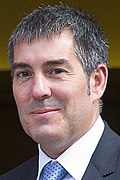| Portrait | Name
(Birth–Death) | Term of office | Party | Government
Composition | Election | Monarch
(Reign) | Ref. |
|---|
| Took office | Left office | Duration |
|---|
 | Jerónimo Saavedra
(1936–2023) | 13 January
1983 | 10 June
1983 | 4 years and 202 days | | PSOE | Saavedra I
PSOE | N/A | King
Juan Carlos I

(1975–2014) | [1]
[2]
[3]
[4] |
10 June
1983 | 20 July
1985 | Saavedra II
PSOE | 1983 |
20 July
1985 | 3 August
1987 | Saavedra III
PSOE |
 | Fernando Fernández Martín
(born 1943) | 3 August
1987 | 3 January
1989 | 1 year and 153 days | | CDS | Fernández
CDS–AIC–AP | 1987 | [5]
[6] |
 | Lorenzo Olarte
(1932–2024) | 3 January
1989 | 12 July
1991 | 2 years and 190 days | | CDS | Olarte
CDS–AIC–AP | [7]
[8] |
 | Jerónimo Saavedra
(1936–2023) | 12 July
1991 | 31 March
1993
(censured) | 1 year and 264 days | | PSOE | Saavedra IV
PSOE–AIC | 1991 | [9]
[10] |
 | Manuel Hermoso
(1935–2025) | 5 April
1993 | 15 July
1995 | 6 years and 103 days | | CCa (AIC) | Hermoso I
CCa | [11]
[12]
[13] |
15 July
1995 | 17 July
1999 | Hermoso II
CCa until May 1996
CCa–PP from May 1996 | 1995 |
 | Román Rodríguez
(born 1956) | 17 July
1999 | 5 July
2003 | 3 years and 353 days | | CCa (ICAN) | Rodríguez
CCa–PP until May 2002
CCa from May 2002 | 1999 | [14]
[15] |
 | Adán Martín
(1943–2010) | 5 July
2003 | 13 July
2007 | 4 years and 8 days | | CCa (ATI) | Martín
CCa–PP until May 2005
CCa from May 2005 | 2003 | [16]
[17] |
 | Paulino Rivero
(born 1952) | 13 July
2007 | 7 July
2011 | 7 years and 361 days | | CCa | Rivero I
CCa–PP until Oct 2010
CCa from Oct 2010 | 2007 | [18]
[19]
[20] |
7 July
2011 | 9 July
2015 | Rivero II
CCa–PSOE | 2011 | King
Felipe VI

(2014–present) |
 | Fernando Clavijo
(born 1971) | 9 July
2015 | 16 July
2019 | 4 years and 7 days | | CCa | Clavijo I
CCa–PSOE until Dec 2016
CCa from Dec 2016 | 2015 | [21]
[22] |
 | Ángel Víctor Torres
(born 1966) | 16 July
2019 | 14 July
2023 | 3 years and 363 days | | PSOE | Torres
PSOE–NCa–Podemos–ASG | 2019 | [23]
[24] |
 | Fernando Clavijo
(born 1971) | 14 July
2023 | Incumbent | 2 years and 80 days | | CCa | Clavijo II
CCa–PP–AHI–ASG | 2023 | [25] |













